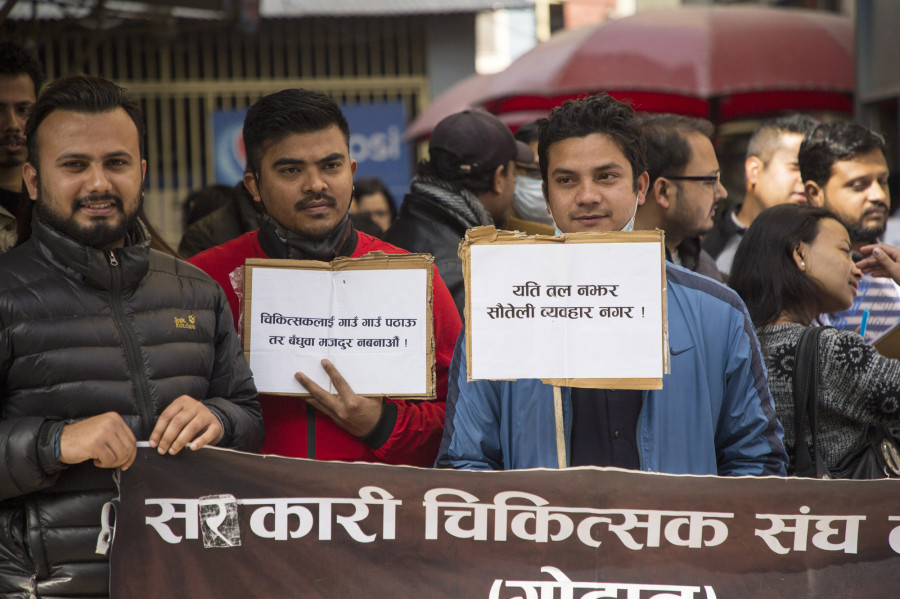Valley
Government doctors say adjustment provision against their career prospects
Dr Sunil Poudel, a consultant physician, has been serving at the Damauli District Hospital of Tanahun for the last five months
Arjun Poudel
Dr Sunil Poudel, a consultant physician, has been serving at the Damauli District Hospital of Tanahun for the last five months. He completed his MD under the government’s scholarship programme. But he says has been unable to use his skills, as the district hospital does not have the required infrastructure nor the required equipment.
“The government invested a lot of money on my studies. But it does not seem to be too keen to use my expertise,” said Poudel. “Neither the government nor the patients have benefited from my skills.” According to him, his expertise can be used in the intensive care unit (ICU), cardiac centre and others special services, which are available at regional and central hospitals only.
Poudel is one of the 1,400 government doctors who are concerned about their career prospects due to a certain provision of the employment adjustment bill.
The bill, recently passed by Parliament, bars government doctors from working under the federal government. The provision has been opposed by government doctors.
Government doctors have announced that they would boycott services indefinitely starting Wednesday if their concerns are not addressed. This will affect thousands of patients throughout the country, as these doctors serve at government health facilities and a majority of patients cannot afford expensive private health care.
“We held several rounds of talks with concerned officials of the Health Ministry,” said Dr Dipendra Pandey, chairman of Government Doctors Association of Nepal. “They say they agree with our concerns, but have not said whether they are going to address them.”
A top official at the Health Ministry said that they understood the government doctors’ problems, but there was nothing the ministry can do at this point of time.
“To address the government doctors’ concerns, the employee adjustment bill needs to be amended. But Parliament has already endorsed it,” Mahendra Prasad Shrestha, chief of the Health Coordination Division at the Ministry of Health, told the Post.
Government doctors say there should have been a different approach to adjusting medical practitioners. According to them, the government should have brought different mechanisms for adjusting doctors and civil servants.
Dr Pandey said that earlier doctors wanted to go to remote districts and serve there because there was an incentive—they would get up to 20 percent marks to pursue higher degrees (MD, MS) at the National Academy of Medical Sciences. But the bill is silent on this provision also.
“Why would one go to a remote region if they do not see their career developing?” Pandey wondered.
For doctors like Poudel, who has served 12 years in various government health facilities including in remote areas like Dolpa for four years, the concern is not where the government deputes them but what are their chances of getting stuck to working under local governments.
“I am ready to work wherever the government sends me, but if I continue to work under local governments, my expertise won’t be fully utilised, as I will be limited to the maximum facilities a district hospital can provide,” he said.
“This will not only diminish my career prospects but also will deprive those people of services who would have benefited from my skills.”
The provision is also likely to affect the National Academy of Medical Sciences.
Dr Gehnath Baral, who is serving at Paropakar Maternity Hospital as a chief consultant for the last three years, is set be deputed to a health facility in Province 1 once the new employment bill comes into force.
Baral, who is also the head of the Masters of Doctor in Gynaecology at the National Academy of Medical Sciences, said around 54 students pursuing higher degrees at the academy could be affected due to the adjustment bill.
Fellowship programme of Gynaecological Oncology and Urogynecology (super specialty of gynaecology) at the academy will be also affected if Baral is transferred, as the academy is already reeling under a shortage of professors.
Baral, who has spent 25 years in government services and served at different health facilities outside the Valley for 22 years, said he has two options left: quit the service or abide by the government’s decision and go to Province 1.
Shrestha of the Health Ministry said: “Yes, we had held several round of talks and reached a conclusion that government doctors would be affected by the bill. But we cannot do anything now.”




 9.51°C Kathmandu
9.51°C Kathmandu














